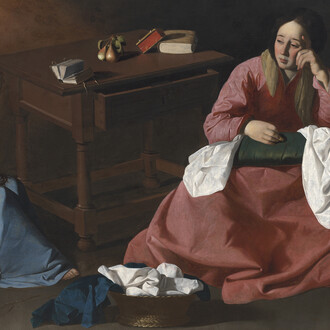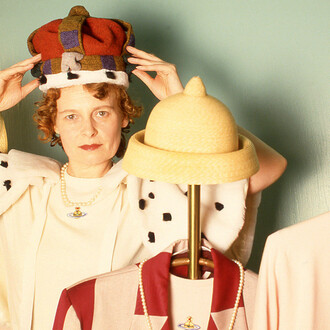Galerie Thaddaeus Ropac London is pleased to present Sylvie Fleury: Hypnotic Poison. Presented in the gallery’s historic Ely Room, new works will be shown alongside pieces from three of the artist’s most significant series – her makeup palettes, a new neon sign installation referencing Christian Dior’s iconic fragrance, Hypnotic Poison, and a new soft Rocket, building on the artist’s earlier rocket works and defying the taut sleekness typically associated with spaceships.
Engaging with the mechanics of materialistic desire, the aesthetics of beauty and the construction of value, Sylvie Fleury’s sleek, alluring works provide a lens through which contemporary politics of gender, beauty and consumerism can be re-evaluated. Her artistic practice, which spans sculpture, performance, installation and painting, combines Marcel Duchamp's idea of the ready-made with Andy Warhol's preoccupation with consumer culture frequently employing materials and processes associated with early Conceptualism, Pop Art, and Minimalism.
‘I’ve always wanted to transform reality, to transform everyday objects. That’s perhaps why I am interested in fashion. Fashion trends reflect our time, but also produce codes that I’ve always wanted to appropriate and play with.’
With her signature makeup palettes, Fleury invites viewers to experience the plush colours and mirrored finishes writ large, highlighting the strategies of seduction used in makeup packaging and branding. The artist enlarges and simplifies luxury cosmetic items – eye-shadows, lipsticks, and blusher compacts – into wall-works and installations in which each product becomes an elusive object of desire. Painted by hand, Fleury’s meticulously executed brushwork achieves the smooth lines and surfaces of factory-manufactured goods, while simultaneously mimicking the ritualistic application of make-up, suggesting the pursuit of the perfect ‘finish’. Her use of shaped canvases, while echoing the shapes of the makeup compacts she references, also evokes the formal vocabulary of Minimalism. Fleury’s colour palette specifically references her source material, blending vibrant tones that correspond to the branded shades of each compact: Chanel’s ‘Pink Explosion’, Clinique’s ‘Moderately Fair SPF 30’, or Tom Ford’s ‘Camera Obscura’. ‘I never liked using the Pantones, so I would always use [my own] system... Painters have palettes; I use makeup colours.’
The neon sign, Hypnotic Poison (2019), specifically created for the Ely Room, casts an immersive, otherworldly green glow, prompting an awareness of the often overlooked by-products of ubiquitous advertising and its underlying associations that subtly permeate our visual culture. In previous neon works, Fleury turned commercial slogans such as ‘Be Amazing’, ‘Yes to All’, and ‘Hydrate’ into ready-mades that reference Joseph Kosuth’s 1960s series Art as idea as idea, in which the dictionary definitions of words constituted the artworks. Investigating the intrinsic links between art and language, Fleury utilises mottos drawn from retail and advertising to question their related ideals and aspirations, interrogating the tropes of contemporary consumerism through its own definitive strategies.
Rocket (2019) belongs to a series of sculptural works begun by Fleury in the early 1990s, in which she explores the power of spaceships to call into question gender dynamics and the imaginative allure of space. Marking a departure from earlier works, which saw the artist create phallic installations of taut, lipstick-coloured rockets, Fleury has reduced the sleek exploratory machine to a humble, plump household pillow, imbuing the sexual connotations of dominance and power with subtle ridicule.
Offering new dialogues, these works point to the fleeting and cyclical essence of fashion and advertising. They hint at society’s broader concerns with temporality and permanence, and the disposability or temporary nature of value in contemporary society: the utopian promise has a pre-determined, seasonal shelf-life. Each work becomes a vessel of contemporary temporality, while the enduring nature and universal recognisability of the brands referenced – Coco Chanel, Christian Dior, Yves Saint Laurent – and of the products themselves highlights the infinite valorisation of female beauty and its defining qualities. Fleury holds up a mirror – both literally and metaphorically – to our systemic, internalised cultural values of beauty and taste. ‘One very common theme about art is that it acts as a mirror, in a way, especially when it gets a bit abstract ... when you look at something, you are taken back to wherever you are in your own head’.
The Swiss artist Sylvie Fleury, born in 1961, lives and works in Geneva. She is known for her mises-en-scène that pointedly critique the contemporary preoccupation with glamour, fashion and luxury products. Recent solo exhibitions include: Sylvie Fleury, Kunstraum Dornbirn; Chaussures italiennes, Istituto Svizzero, Rome (both 2019); Sylvie Fleury: LA Bougainvillea, Karma International, Los Angeles; Palettes of Shadows, Galerie Thaddaeus Ropac, Paris (both 2018); Eternity Now, part of the permanent collection at The Bass Museum, Miami (2017, 2015); Camino Del Sol, Galerie Thaddaeus Ropac, Paris (2014); and Sylvie Fleury, CAC / Centro de Arte Contemporaneo, Malaga (2011). She has exhibited in group shows internationally, including at the Daimler Contemporary, Berlin; Leopold Museum, Vienna; Kunsthaus Zurich; Kunstverein Hannover and Kunstverein Frankfurt. In 2018 she was awarded the Prix Meret Oppenheim and in 2015 received The Geneva Société des Arts Prize.















